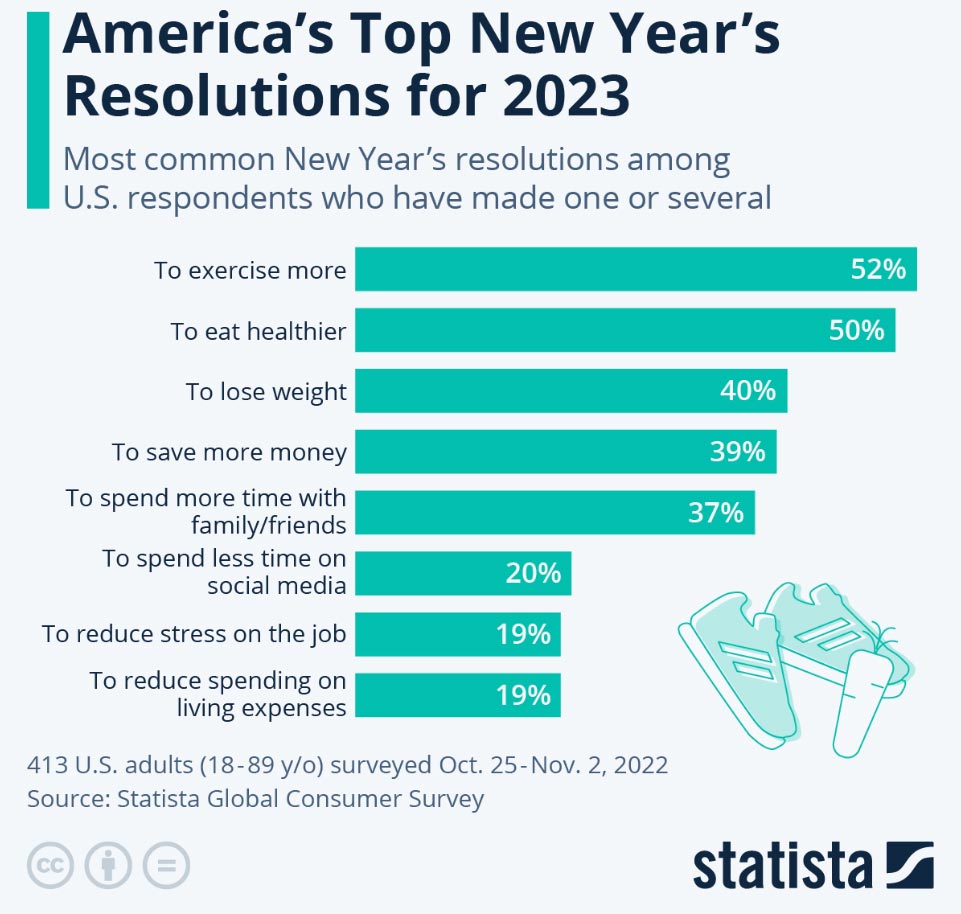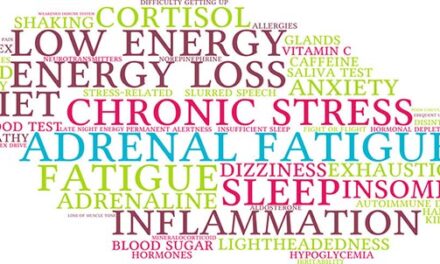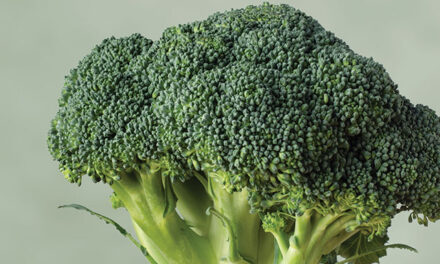Another New Year is approaching, and you know what that means: time for New Year’s resolutions. According to the United States government in 2014, five of the top ten New Year’s resolutions were:
- Lose Weight
- Get a Better Education
- Get Fit
- Eat Healthy Food
- Manage Stress
Coming in to 2023, according to Statisa.com, America’s top New Year’s resolutions were1:
What are your up coming New Year’s Resolutions going to be?
Lose Weight
Of course it’s easy to make resolutions, but hard to keep them. So what can you do to make it easier? While there is no substitute for willpower and commitment, this article will review some nutraceuticals which may actually help you be more effective at adhering to resolutions.
We all know that diet and exercise are necessary components for a successful weight loss program. In addition there are nutraceuticals which can also help. Two of these are L-carnitine and Garcinia cambogia.
L-carnitine
The amino acid L-carnitine plays an important role in energy production by chaperoning activated fatty acids into the mitochondrial matrix to be metabolized.2 Unfortunately, research suggests that being overweight is associated with carnitine insufficiency, Studies have also shown that supplementation with L-carnitine is capable of promoting greater weight loss than with diet and exercise alone (500 mg-3 g/day),4,5,6 and improving various measures of exercise performance and recovery (2 g/day).7,8,9,10,11,12,13,14
Garcina cambogia
Garcina cambogia is a tropical plant that contains a compound known as (-)-hydroxycitric acid (HCA)—which has some interesting biological properties.15 Specifically, research indicates that HCA may help reduce the conversion of carbohydrates into fatty acids,17,18 which could mean less fat stored in your fat cells. Also, research19,20,21,22,23,24 suggests that HCA may help reduce appetite and food intake. In one study with overweight men and women,25 300 mg HCA (as G. cambogia extract standardized for HCA), three times daily, 60 minutes before lunch and dinner, and 2 hours after dinner (to prevent snacking in the evening) resulted in 15–30 percent reduced calorie intake. Furthermore, human clinical research26 demonstrated that 440 mg HCA three times daily, 30 minutes prior to breakfast, lunch and dinner (as G. cambogia extract standardized for HCA) resulted in 14 lbs weight loss, compared to 8 lbs weight loss with diet and exercise alone (1200 calories/ day low fat diet, exercise 3 times/week). Other research has shown similar results.27,28,29
GET A BETTER EDUCATION
Arguably, getting a better education will take more of a time commitment than any other resolution discussed in this article. Of course it’s also the resolution that is most likely to get you a better job and outlook for the future. Nevertheless, it will involve a great deal of reading and studying, which means that you need to have a good memory and good cognitive function. Phosphatidylserine (PS) may be able to help. PS is an integral component in the structure of the brain and spinal cord, and a significant amount of published clinical research has demonstrated that PS supplementation supports various cognitive parameters in adults and in children.30 This is an important consideration if you’re a middle-aged adult going back to school, because that’s the time that age-related memory impairment can start to rear its ugly head. Luckily, research31,32,33,34 has shown that 100–300 mg of PS daily has helped reduce memory complaints and improve memory difficulties (including learning and remembering written information) in age-related memory impairment. PS can also help young adult students. This was shown in a study35 on 17–18 year old students who received 100 mg of PS daily. Supplementation with PS resulted in significant improvement in memory and improved cognitive performance in students.
GET FIT
Getting fit is primarily a function of a regular exercise program, as well as good nutrition. Naturally, anything that can help you achieve results more quickly or effectively is desirable— assuming that we’re talking about something healthy and legal. In this case, L-arginine, beta-alanine and branched-chain amino acids fit the bill exactly.
L-arginine
The amino acid L-arginine is a precursor to nitric oxide, a vasodilator produced by the body to facilitate circulation.36 Consequently, supplementation with L-arginine has been shown to increase oxygen transport during exercise and improve aerobic exercise (6 g/day)37,38 and increase circulating growth hormone levels in response to exercise (5–9 g/day, 30 minutes before exercise);39 and growth hormone can help support the development of new muscle.
Beta-alanine
Research suggests that during high-intensity exercise and strength training, 2.4 grams to 6.4 grams daily of the amino acid beta-alanine improves some measures of physical performance (e.g. increases ventilatory threshold, time to onset of muscle fatigue, time to exhaustion, and total work). A meta-analysis of 15 studies demonstrated that beta-alanine significantly improved exercise measures compared to placebo.40
Branched-chain amino acids
Leucine, isoleucine and valine are collectively referred to as the branched-chain amino acids (BCAAs). BCAAs have also been shown to significantly reduce the breakdown of skeletal muscle in normal and exercising Volunteers,41,42,43,45,46 decrease muscle soreness and muscle fatigue occurring for a few days after exercise,47,48 and decrease lactic acid levels during exercise.49,50,51,52 Doses of 1.3–5.7 g/day have been used.
EAT HEALTHY FOOD
If you think you need to eat a healthier diet, you’re in good company. According the USDA, only 10 percent of the American population eats a good diet.53 So by all means, take every measure possible to eat healthier food. At the same time it’s important to realize that even when your diet improves, that doesn’t necessarily mean that you’ll be getting all of the vitamins and minerals you need. In fact, according to the goals of nutrient intake established by the USDA,54 comparing the nutritional goals for Americans to the nutrient content of foods consumed in a 2000 calorie per day diet, there will be insufficient amounts of vitamin D, vitamin E, choline, magnesium (for men only) and potassium. So even if you follow dietary guidelines there is a good chance that you still won’t be reaching 100 percent of your nutrient intake goals.
This doesn’t mean that you shouldn’t bother eating a healthy diet; it just means that you need a nutrition insurance policy in the form of a good daily multivitamin. Not only will this help assure that you fill in the missing nutrient gaps,55 but research suggests that a good daily multivitamin may offer other benefits as well, which include supporting better cardiovascular health,56,57,58,59,60,61 reducing the risk of certain types of cancer,62 improving stress and energy,63,64,65 and maybe even help you live longer.66
MANAGE STRESS
Given the many adverse effects that stress can have on our lives, it makes very good sense to try and manage it better. While this can and should include attempts to decrease external stressors, it can also include techniques like biofeedback to help you remain calmer in the face of stress. Another complementary approach is the use of L-theanine and lemon balm.
L-theanine
Asian cultures have often used teas for relaxation effects. The relaxing effect is, at least in part, caused by the presence of a neurologically active amino acid, L-theanine. In research, L-theanine was shown to significantly increase brain activity in the alpha frequency band (calming brain waves), and improve mental alertness while promoting relaxation,67,68 L-theanine has also been shown to induce feelings of tranquility in subjects69 and have a direct anti-stress effect via the inhibition of cortical neuron excitation (50–200 mg).70
Lemon balm
The herb lemon balm is often used as a mild mood elevator and calming herb in people with anxiety. It has been shown to improve attention and calmness in healthy volunteers.71 In human clinical research,72 600 mg lemon balm extract improved the negative mood effects of stress, with significantly increased self-ratings of calmness. Also, the European Scientific Cooperative on Phytotherapy (an umbrella organization representing national herbal medicine or phytotherapy [aka, herbal medicine] associations across Europe), lists tenseness, restlessness and irritability among the uses for lemon balm.73 The use of lemon balm as a brewed herb offers the additional benefit of delivering the herb as a warm beverage, adding to its soothing qualities.
Conclusion
The use of the nutraceuticals discussed in this article won’t guarantee that you will stick to your New Year’s resolution. You still need willpower and commitment. That being said, these nutraceuticals will provide you with extra support, and they may help you be more effective at adhering to your resolutions.
- References
- Popular New Year’s Resolutions.
- Rebouche CJ. Carnitine. In: Shils ME, Shike M, Ross AC, Caballero B, Cousins RJ, eds. Modern Nutrition in Health and Disease. 10th ed. Philadelphia: Lippincott, Williams & Wilkins; 2006:537-544.
- Noland RC, Koves TR, Seiler SE, et al. Carnitine insufficiency caused by aging and over-nutrition compromises mitochondrial performance and metabolic control. J Biol Chem 2009;284(34):22840-52.
- Sufeng, Z, Zhichian H, Jianping L, Hui S. L-Carnitine’s effect on comprehensive wight loss program in obese adolescents. Acta Nutr Sin 1997; 19(2):146-150.
- Lurz R, Fischer R. Carnitine as supporting agent in weight loss in adiposity. Aerztezeitschrift für Naturheilverfahren 1998; 39(1):12-15.
- Odo S, Tanabe K, Yamauchi M. A Pilot Clinical Trial on L-Carnitine Supplementation in Combination with Motivation Training: Effects on Weight Management in Healthy Volunteers. Food and Nutrition Sciences. 2013;(4)2:222-231.
- Spiering BA, Kraemer WJ, Hatfield DL, Vingren JL, Fragala MS, Ho JY, Thomas GA, Häkkinen K, Volek JS. Effects of L-carnitine L-tartrate supplementation on muscle oxygenation responses to resistance exercise. J Strength Cond Res. 2008 Jul;22(4):1130-5.
- Ho JY, Kraemer WJ, Volek JS, Fragala MS, Thomas GA, Dunn-Lewis C, Coday M, Häkkinen K, Maresh CM. l-Carnitine l-tartrate supplementation favorably affects biochemical markers of recovery from physical exertion in middle-aged men and women. Metabolism. 2010 Aug;59(8):1190-9.
- Spiering BA, Kraemer WJ, Vingren JL, Hatfield DL, Fragala MS, Ho JY, Maresh CM, Anderson JM, Volek JS. Responses of criterion variables to different supplemental doses of L-carnitine L-tartrate. J Strength Cond Res. 2007 Feb;21(1):259-64.
- Borghi-Silva A, Baldissera V, Sampaio LM, Pires-DiLorenzo VA, Jamami M, Demonte A, Marchini JS, Costa D. L-carnitine as an ergogenic aid for patients with chronic obstructive pulmonary disease submitted to whole-body and respiratory muscle training programs. Braz J Med Biol Res. 2006 Apr;39(4):465-74.
- Kraemer WJ, Volek JS, French DN, Rubin MR, Sharman MJ, Gómez AL, Ratamess NA, Newton RU, Jemiolo B, Craig BW, Häkkinen K. The effects of L-carnitine L-tartrate supplementation on hormonal responses to resistance exercise and recovery. J Strength Cond Res. 2003 Aug;17(3):455-62.
- Kraemer WJ, Spiering BA, Volek JS, Ratamess NA, Sharman MJ, Rubin MR, French DN, Silvestre R, Hatfield DL, Van Heest JL, Vingren JL, Judelson DA, Deschenes MR, Maresh CM. Androgenic responses to resistance exercise: effects of feeding and L-carnitine. Med Sci Sports Exerc. 2006 Jul;38(7):1288-96.
- Volek JS, Kraemer WJ, Rubin MR, Gómez AL, Ratamess NA, Gaynor P. L-Carnitine L-tartrate supplementation favorably affects markers of recovery from exercise stress. Am J Physiol Endocrinol Metab. 2002 Feb;282(2):E474-82.
- Giamberardino MA, Dragani L, Valente R, Di Lisa F, Saggini R, Vecchiet L. Effects of prolonged L-carnitine administration on delayed muscle pain and CK release after eccentric effort. Int J Sports Med. 1996 Jul;17(5):320-4.
- Jena BS, Jayaprakasha GK, Singh RP, Sakariah KK. Chemistry and biochemistry of (-)-hydroxycitric acid from Garcinia. Journal of agricultural and food chemistry. 2002;50(1):10-22.
- Watson JA, Fang M, Lowenstein JM. Tricarballylate and hydroxycitrate: Substrate and inhibition of ATP:citrate oxaloacetatae lyase. Arch Biochem Biophys. 1969;135:209-217.
- Hayamizu K, Ishii Y, Kaneko I, Shen M, Okuhara Y, Shigematsu N, Tomi H, Furuse M, Yoshino G, Shimasaki H. Effects of Garcinia cambogia (Hydroxycitric Acid) on Visceral Fat Accumulation: A Double-Blind, Randomized, Placebo-Controlled Trial. Current Therapeutic Research – Clinical and Experimental; 2003;64(8):551-567.
- Jena BS, Jayaprakasha GK, Singh RP, Sakariah KK. Chemistry and biochemistry of (-)-hydroxycitric acid from Garcinia. Journal of agricultural and food chemistry. 2002;50(1):10-22.
- Sullivan AC, Triscari J. Metabolic regulation as a control for lipid disorders, I. Influence of (-)-hydroxycitrate on experimentally induced obesity in the rodent. Am J Clin. Nutr. 1977;30:767-776.
- Greenwood MR, Cleary MP, Gruen R, Blase´ D, Stern JS, Triscar J, Sullivan AC. ,1981. Effect of (-)-hydroxycitrate on development of obesity in the Zucker obese rat. Am J Physiol. 1981;240:E72-78.
- Rao RN, Sakariah KK. Lipid-lowering and antiobesity effect of (-)-hydroxycitric acid. Nutr Res. 1988;8:209-212.
- Sullivan AC, Triscari J, Hamilton JG, Miller ON, Wheatley VR. Effect of (-)-hydroxycitrate upon the accumulation of lipid in rat. I. Lipogenesis. Lipids. 1974;9:121-128.
- Sullivan AC, Triscari J, Hamilton JG, Miller ON. Effect of (-)-hydroxycitrate upon the accumulation of lipid in the rat. II. Appetite. Lipids. 1974;9:129-134.
- Panksepp J, Pollack A, Meeker RB, Sullivan AC. (-)-Hydroxycitrate and conditioned aversions. Pharmacol Biochem Behav. 1977;6:683-687.
- Westerterp-Plantenga MS, Kovacs EMR. 2002. The effect of (-)-hydroxycitrate on energy intake and satiety in overweight humans. International Journal of Obesity. 2002;26:870-872.
- Thom E. Hydroxycitrate (HCA) in the treatment of obesity. Int J Obes. 1996;20(supp4):48.
- Mattes RD, Bormann L. Effects of (-)-hydroxycitric acid on appetitive variables. Physiology & Behavior. 2000;71(1-2):87-94.
- Preuss HG, Bagchi D, Rao CVS, Echard BW, Satyanarayana S, Bagchi M. Effect of hydroxycitric acid on weight loss, Body Mass Index and plasma leptin levels in human subjects. FASEB Journal. 2002;16(5):pA. 1020.
- Hayamizu K, Ishii Y, Kaneko I, Shen M, Okuhara Y, Shigematsu N, Tomi H, Furuse M, Yoshino G, Shimasaki H. Effects of Garcinia cambogia (Hydroxycitric Acid) on Visceral Fat Accumulation: A Double-Blind, Randomized, Placebo-Controlled Trial. Current Therapeutic Research – Clinical and Experimental; 2003;64(8):551-567.
- Kidd, P.M. 1999, ‘A review of nutrients and botanicals in the integrative management of cognitive dysfunction’, Alternative Medicine Review, vol. 4, no. 3, pp. 144-61.
- Kato-Kataoka, A., Sakai, M., Ebina, R., Nonaka, C., Asano, T. & Miyamori, T. 2010, ‘Soybean-Derived Phosphatidylserine Improves Memory Function of the Elderly Japanese Subjects with Memory Complaints’, J. Clin. Biochem. Nutr., vol. 47, pp. 246–255.
- Gindin, J., Novikov, M., Dedar, D., Walter- Ginzburg, A., Naor, S., Levi, S. 2009, ‘The effect of plant phosphtidylserine on age-associated memory impairment and mood in the functioning elderly’, The Geriatric Institute for Education and Research, and Department of Geriatrics, Kaplan Hospital, Rehovot, Israel. Unpublished report.
- Crook, T.H. 1998, “Treatment of Age-Related Cognitive Decline: Effects of Phosphatidylserine”, In Anti-Aging Medical Therapeutics, Vol II, edited by Klatz, R.M. Health Quest Publications, Chicago, pp. 20-29.
- Cenacchi, T., Bertoldin, T., Farina, C., Fiori, M.G., Crepaldi, G., and participating investigators. 1993, ‘Cognitive decline in the elderly: A double-blind, placebo-controlled multicenter study on efficacy of phosphatidyiserine administration’, Aging Clin. Exp. Res., vol. 5, pp. 123-133.
- Yong T, Qianyong Z, Mantian M, Gang H, Jing W. Research on human memory enhancement by phosphatidylserine fortified milk. Chongqing Medicine. 2011;30.003. doi: 10.3969.
- Tapiero H, Mathe G, Couvreur P, et al. I. Arginine. Biomedicine & pharmacotherapy = Biomedecine & pharmacotherapie (France) 2002; 56(9):439-45.
- Bailey SJ, Winyard PG, Vanhatalo A, Blackwell JR, DiMenna FJ, Wilkerson DP, Jones AM. Acute L-arginine supplementation reduces the O2 cost of moderate intensity exercise and enhances high-intensity exercise tolerance. J Appl Physiol. 2010 Nov;109(5):1394-403.
- Koppo K, Taes YE, Pottier A, Boone J, Bouckaert J, Derave W. Dietary arginine supplementation speeds pulmonary VO2 kinetics during cycle exercise. Med Sci Sports Exerc. 2009 Aug;41(8):1626-32.
- Collier SR, Casey DP, Kanaley JA. Growth hormone responses to varying doses of oral arginine. Growth Horm IGF Res. 2005 Apr;15(2):136-9.
- Hobson RM, Saunders B, Ball G, et al. Effects of ß-alanine supplementation on exercise performance: a meta-analysis. Amino Acids 2012;43:25-37.
- Louard RJ, Barrett EJ, Gelfand RA.Overnight branched-chain amino acid infusion causes sustained suppression of muscle proteolysis. Metabolism 1995;44(4):424-9.
- MacLean DA, Graham TE, Saltin B. Branched-chain amino acids augment ammonia metabolism while attenuating protein breakdown during exercise. Am J Physiol 1994;267:E1010-22.
- Greer BK, Woodard JL, White JP, Arguello EM, Haymes EM. Branched-chain amino acid supplementation and indicators of muscle damage after endurance exercise. Int J Sport Nutr Exerc Metab 2007;17(6):595-607.
- Coombes JS, McNaughton LR. Effects of branched-chain amino acid supplementation on serum creatine kinase and lactate dehydrogenase after prolonged exercise. J Sports Med Phys Fitness 2000;40(3):240-6.
- Shimomura Y, Murakami T, Nakai N, Nagasaki M, Harris RA. Exercise promotes BCAA catabolism: effects of BCAA supplementation on skeletal muscle during exercise. J Nutr 2004 Jun;134(6 Suppl):1583S-1587S.
- Tang FC. Influence of branched-chain amino acid supplementation on urinary protein metabolite concentrations after swimming. J Am Coll Nutr 2006;25(3):188-94.
- Shimomura Y, Murakami T, Nakai N, Nagasaki M, Harris RA. Exercise promotes BCAA catabolism: effects of BCAA supplementation on skeletal muscle during exercise. J Nutr 2004 Jun;134(6 Suppl):1583S-1587S.
- Shimomura Y, Yamamoto Y, Bajotto G, Sato J, Murakami T, Shimomura N, Kobayashi H, Mawatari K. Nutraceutical effects of branched-chain amino acids on skeletal muscle. J Nutr 2006;136(2):529S-532S.
- MacLean DA, Graham TE, Saltin B. Stimulation of muscle ammonia production during exercise following branched-chain amino acid supplementation in humans. J Physiol 1996;493(Pt 3):909-22.
- De Palo EF, Gatti R, Cappellin E, Schiraldi C, De Palo CB, Spinella P. Plasma lactate, GH and GH-binding protein levels in exercise following BCAA supplementation in athletes. Amino Acids 2001;20(1):1-11.
- Coombes JS, McNaughton LR. Effects of branched-chain amino acid supplementation on serum creatine kinase and lactate dehydrogenase after prolonged exercise. J Sports Med Phys Fitness 2000;40(3):240-6.
- Koba T, Hamada K, Sakurai M, Matsumoto K, Hayase H, Imaizumi K, Tsujimoto H, Mitsuzono R. Branched-chain amino acids supplementation attenuates the accumulation of blood lactate dehydrogenase during distance running. J Sports Med Phys Fitness 2007;47(3):316-22.
- Report Card on the Quality of Americans’ Diets. Nutrition Insights, INSIGHT 28. USDA Center for Nutrition Policy and Promotion. December 2002.
- United States Department of Agriculture. Center for Nutrition Policy and Promotion/Comparison of Nutrient Content of each 2010 USDA Food Pattern to Nutritional Goals for that Pattern. Retrieved August 19, 2014 from http://www.cnpp.usda.gov/Publications/USDAFoodPatterns/
- Fletcher RH, Fairfield KM. Vitamins for Chronic Disease Prevention in Adults. JAMA 2002; 287(23):3127-3129.
- Earnest CP, Wood KA, Church TS. Complex Multivitamin Supplementation Improves Homocysteine and Resistance to LDL-C Oxidation. J Am Coll Nutr. 2003;22(5):400–407 .
- den Heijer M, Brouwer IA, Bos GM, et al. Vitamin supplementation reduces blood homocysteine levels: a controlled trial in patients with venous thrombosis and healthy volunteers. Arterioscler Thromb Vasc Biol. 1998 Mar;18(3):356-61.
- Church TS, Earnest CP, Wood KA. James B. Kampert. Reduction of C-Reactive Protein Levels Through Use of a Multivitamin. Am J Med. 2003;115:702–707.
- Wang C, Li Y, Zhu K, Dong YM, Sun CH. Effects of supplementation with multivitamin and mineral on blood pressure and C-reactive protein in obese Chinese women with increased cardiovascular disease risk. Asia Pac J Clin Nutr. 2009;18(1):121-30.
- Holmquist C, Larsson S, Wolk A, de Faire U. Multivitamin Supplements Are Inversely Associated with Risk of Myocardial Infarction in Men and Women—Stockholm Heart. Epidemiology Program (SHEEP). J Nutr. 2003;133: 2650–2654.
- Rautiainen S, Akesson A, Levitan EB, Morgenstern R, Mittleman MA, Wolk A. Multivitamin use and the risk of myocardial infarction: a population-based cohort of Swedish women. Am J Clin Nutr. 2010 Nov;92(5):1251-6.
- Gaziano JM, Sesso HD, Christen WG, Bubes V, Smith JP, MacFadyen J, Schvartz M, Manson JE, Glynn RJ, Buring JE. Multivitamins in the prevention of cancer in men: the Physicians’ Health Study II randomized controlled trial. JAMA. 2012 Nov 14;308(18):1871-80.
- Suarez EC. Plasma interleukin-6 is associated with psychological coronary risk factors: moderation by use of multivitamin supplements. Brain Behav Immun. 2003 Aug;17(4):296-303.
- Huskisson E, Maggini S, Ruf M. The role of vitamins and minerals in energy metabolism and well-being. J Int Med Res. 2007 May-Jun;35(3):277-89.
- Long SJ, Benton D. Effects of vitamin and mineral supplementation on stress, mild psychiatric symptoms, and mood in nonclinical samples: a meta-analysis. Psychosom Med. 2013 Feb;75(2):144-53.
- Xu Q, Parks CG, DeRoo LA, Cawthon RM, Sandler DP, Chen H. Multivitamin use and telomere length in women. Am J Clin Nutr. 2009;89(6):1857-63.
- Nobre AC, Rao A, Owen GN. L-theanine, a natural constituent in tea, and its effect on mental state. Asia Pac J Clin Nutr 2008;17 Suppl 1:167-8.
- Mason,R. 200 mg of Zen. Alternative & Complementary Therapies 2001; 7(2):91-95.
- Lu K, Gray MA, Oliver C, et al. The acute effects of L-theanine in comparison with alprazolam on anticipatory anxiety in humans. Hum Psychopharmacol Clin Exp 2004;19:457–65.
- Kimura K, Ozeki M, Juneja LR, Ohira H. L-Theanine reduces psychological and physiological stress responses. Biol Psychol 2007;74(1):39-45
- Abascal K, Yarnell E. Nervine herbs for treating anxiety Altern Compliment Ther. 2004 December:309-315.
- Kennedy DO, Little W, Scholey AB. Attenuation of laboratory-induced stress in humans after acute administration of Melissa officinalis (Lemon Balm). Psychosom Med. 2004 Jul-Aug;66(4):607-13.
- ESCOP. Melissae folium. Monographs on the Medicinal Uses of Plant Drugs. Exeter, U.K. European Scientific Cooperative on Phytotherapy; 1997.












